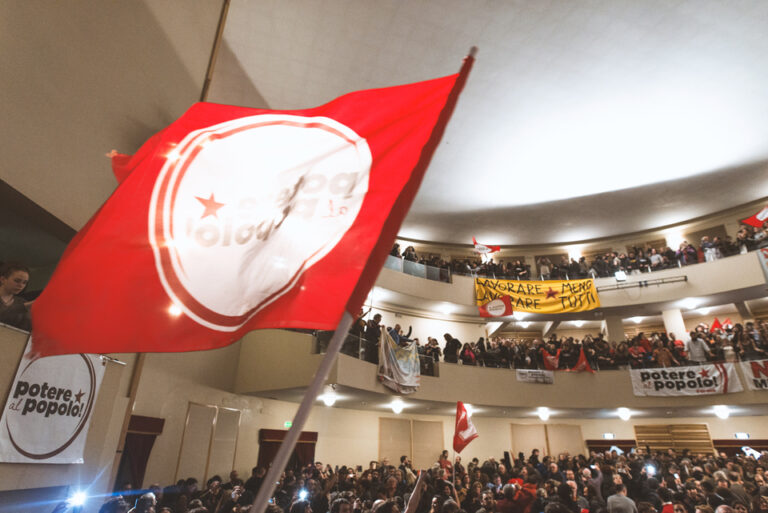On the 21st May migrant agricultural workers across Italy will strike in protest over the new immigration rules announced by the government. These new rules – offering only 6 month permits for workers in limited sectors – fall far short of what has been demanded by the workers, and of what would be necessary to ensure that they can live and work in safety and dignity.
Agricultural workers are therefore striking to make their demands heard: unconditional residency permits for all undocumented migrants regardless of employment status; a dignified salary; public housing programmes for seasonal agricultural labourers.
Why is the strike important?
Agricultural labour is the first rung of the food supply chain. Taken with all its corollaries, agriculture is Italy’s biggest sector, yet there is a vast inequality in how this wealth is distributed. Large food retailers and supermarket chains exercise enormous power over the rest of the sector, dictating at will prices and working conditions on producers, who usually small businesses with little bargaining power. This pressure from above translates into an attempt on the part of producers to save as much as possible on the only easily controllable variable: labour costs. Hence labourers are faced with inhumane working conditions and poverty wages. But it is not only the labourers that are affected by this inequality – just as producers squeeze wages to maximise their profits, so the supermarkets squeeze the wages of their cashiers, and the transport companies their drivers.
These months of crisis have made these inequalities more manifest than ever. In a period in which large parts of the economy have been shut down, big food retailers are making millions. During the lockdown we have been shopping more frequently in big supermarkets and buying more than usual. Between March and April food sales were up by 18% compared to last year, with 44% of purchases in the major supermarket chains.
And as sales piled up, and with them the profits of the retail owners, so too did the hours worked by cashiers and shelf-stockers. There have been many reports of the exploitative working conditions borne by supermarket workers over the last few months. On top of this many have not been provided adequate PPE and have been threatened with dismissal simply for speaking out. Further still, many supermarket chains have taken advantage of the government’s emergency measures to furlough thousands of workers even while business is booming. Workers are therefore suffering across the sector.
But while supermarket staff were being furloughed, fears were mounting of a labour shortage in the fields, revealing the extent to which Italy’s agricultural sector is dependent on migrant labour. After months of debate over a possible regularisation of undocumented migrants, the law that has finally been unveiled is little more than a scam. The motivation behind it is not the welfare of these migrant workers but concerns over an impending food crisis – the so-called “amnesty” is restricted to limited sectors and offering only 6 months legal residency, just enough to cover the harvest season. It is simply a means of propping up the agriculture industry by allowing the existing mechanisms of exploitation to continue functioning.
The farm labourers strike therefore raises the question not only of their own exploitation, but of the exploitation inherent to an entire sector. They are striking for the rights of all food workers, and asking for unity and solidarity.
What are the costs of agricultural production? A call for greater transparency in prices.
Producing 1kg of organic clementines costs 26 cents. To this is added the cost of the labour required for the harvest, for packaging and for transport. The large supermarket chains buy fruit from intermediaries, hardly ever directly from producers. As such, a producer, in order to stay afloat, must sell their clementines for at least 60 cents a kilo.
In 2019 organic clementines from the Gioia Tauro plane in Calabria, Italy were selling for 32 cents a kilo, with producers having to bear the cost of the harvest. Minus 11 cents for the harvest, the price of a kilo of clementines becomes 21 cents – significantly under-priced. These are the same clementines you find in the supermarket for € 2.50/kg (or even more in a British or German supermarket).
What this basic calculation shows us is that for producers there is only one variable from which they can save: the cost of labour. The exploitation of the farm labourers and of small producers, but also of the transport workers and supermarket employees is therefore a structural element in a value chain that generates enormous profits for those at the top and poverty wages and inhumane working conditions for those at the bottom.
We are therefore demanding that the big supermarket chains in Italy be required to display not only the sale price of their products but also the price they paid to the producers and any intermediaries (the source price). This would give us a way to trace the distribution of wealth across the value chain and raise awareness about the inequalities that exist in the sector, as a first step in pushing for greater change.
Our demands.
On the 21st of May we will demonstrate outside Italian supermarkets in solidarity with agricultural labourers striking against exploitation, bringing their demands out from the fields into the cities:
- Unconditional residency permits for all undocumented migrants, to ensure that all migrants’ basic rights are respected and that no one is forced to work illegally;
- dignified working conditions for everyone in the food/agriculture industry (farm labourers, transport workers, supermarket employees, warehouse workers);
- legislation requiring supermarkets to display source prices so that costs can be traced across the value chain.
We are asking workers and unions internationally to support the strike with us, via social media, because the agricultural industry is international: the food produced by farm labourers in Italy ends up in supermarkets across Europe and even the world. The struggle of farm labourers in Italy concerns us all: it is the struggle of the key workers who put food on our tables and who live and labour in appalling conditions because of the greed of the large food retailers.



